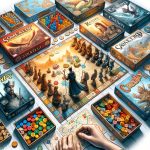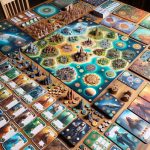Are you a fan of strategic thinking and engaging gameplay? Strategy and board games offer a unique blend of challenge, excitement, and intellectual stimulation for players of all ages. Whether you’re a seasoned strategist or just dipping your toes into the world of tabletop gaming, there’s something to be said about the thrill of outsmarting your opponents and claiming victory.
The history of strategy games dates back to ancient civilizations, where rulers and military strategists used board games as tools for planning battles and sharpening their tactical skills. Fast forward to the modern era, and we see an explosion of board games that cater to a diverse range of interests and preferences. From classic titles like Chess and Go to innovative new releases, the world of strategy gaming continues to evolve and captivate players worldwide.
But what exactly sets strategy games apart from traditional board games? While both genres require strategic thinking and decision-making skills, strategy games often involve complex rules, resource management, long-term planning, and competitive gameplay. Board games, on the other hand, encompass a broader range of gameplay styles that may focus more on luck or social interaction. By understanding the differences between these two categories, players can choose the type of game that best suits their preferences and play style.
The History of Strategy Games
Strategy games have been a part of human civilization for centuries, with roots that can be traced back to ancient civilizations. One of the earliest known strategy games is Chess, which originated in India around the 6th century AD. Chess spread throughout the world and evolved into different variations, becoming a classic strategic board game that challenges players’ tactical skills and foresight.
As time passed, new forms of strategy games emerged across different cultures. Games like Go from China, Shogi from Japan, and Mancala from Africa became popular strategic pastimes that required players to think critically and plan their moves ahead. These ancient strategy games laid the foundation for the development of modern classics like Risk, Settlers of Catan, and Ticket to Ride.
The evolution of technology has also played a significant role in shaping strategy games over the years. With the rise of video games and online gaming platforms, strategy games have expanded beyond traditional board games to include digital versions with complex gameplay mechanics and immersive graphics. Despite these advancements, many enthusiasts still appreciate the timeless appeal of classic board games that test their strategic thinking and decision-making skills.
| Chess Origin | 6th Century AD in India |
|---|---|
| Go Origin | Ancient China |
| Shogi Origin | Ancient Japan |
| Mancala Origin | Ancient Africa |
Board Games vs Strategy Games
What Makes a Board Game Different From a Strategy Game?
Board games and strategy games are both popular forms of entertainment that involve skill, planning, and decision-making. However, there are key differences between the two genres that set them apart. Board games typically have a clear set of rules and objectives, often involving elements like luck or chance. These games may focus more on social interaction and competition among players.
On the other hand, strategy games require players to think critically and strategically in order to outsmart their opponents. These games often involve complex gameplay mechanics, resource management, and long-term planning. Strategy games can range from turn-based tactical games to real-time simulations, offering a variety of experiences for players to enjoy.
Examples of Board Games vs. Strategy Games
To better understand the difference between board games and strategy games, it’s helpful to look at specific examples from each genre. Classic board games like Monopoly or Scrabble are straightforward in their rules and gameplay, relying on luck and player interactions to drive the experience. These games are easy to learn but can require strategic thinking to win.
In contrast, strategy games like Chess or Settlers of Catan demand deep strategic thinking and planning from players. These games often have multiple paths to victory, allowing for different strategies to be employed based on the game state. Players must anticipate their opponents’ moves and adapt their strategy accordingly in order to succeed. The complexity and depth of strategy games make them a favorite among gamers looking for a challenging mental workout.
Choosing Between Board Games and Strategy Games
When deciding between playing a board game or a strategy game, it ultimately comes down to personal preference and play style. If you enjoy social interaction, light-hearted competition, and simple mechanics, board games may be more appealing to you. On the other hand, if you thrive on complex decision-making, long-term planning, and outwitting your opponents through strategic maneuvers, then strategy games will likely be right up your alley.
Regardless of which genre you prefer, both board games and strategy games offer unique experiences that can entertain and challenge players of all ages. Choosing between the two genres can depend on factors such as mood, group dynamics, or personal gaming preferences. With such a wide variety of options available in both genres, there is no shortage of opportunities to test your skills and strategize your way to victory in the world of tabletop gaming.
The Benefits of Playing Strategy and Board Games
Enhancing Problem-Solving Skills
Playing strategy and board games is not just a fun pastime; it can also have significant benefits for your cognitive abilities. One of the key advantages of these games is their ability to enhance problem-solving skills.
Whether you’re trying to outmaneuver your opponents in a game of chess or cultivate resources efficiently in Settlers of Catan, strategy games require players to think critically and make strategic decisions. This constant engagement with challenging scenarios helps improve analytical thinking and decision-making skills.
Improving Strategic Planning
Another major benefit of playing strategy and board games is the improvement of strategic planning abilities. Successful players in these games are those who can anticipate their opponent’s moves, adapt to changing circumstances, and plan several steps ahead. By honing these skills in a gaming environment, individuals can transfer them to real-life situations where strategic thinking is required. Whether in business, academics, or personal life, the ability to devise effective strategies can be invaluable for achieving success.
Boosting Memory and Concentration
In addition to enhancing problem-solving and strategic planning skills, playing strategy and board games can also boost memory retention and concentration. Many strategy games involve remembering rules, tracking moves, and predicting outcomes based on previous actions. This constant mental engagement helps improve memory recall and the ability to focus for extended periods. As a result, regular gameplay can help individuals sharpen their minds, stay mentally alert, and develop greater cognitive resilience over time.
Top 10 Strategy Board Games
When it comes to strategy board games, there is a wide array of options available that cater to different preferences and skill levels. Whether you prefer intense battles of military tactics or strategic resource management, there is a game out there for you. Here are some of the top 10 strategy board games that have captured the hearts of players around the world:
- Settlers of Catan: This classic game challenges players to build roads, settlements, and cities while trading resources with others.
- Ticket to Ride: Players compete to build train routes across North America, Europe, and other regions in this exciting game of strategy and luck.
- Pandemic: In this cooperative game, players work together to stop global outbreaks of diseases by strategically managing their resources and abilities.
- Agricola: A popular farming game where players must manage their resources effectively to grow crops, raise livestock, and expand their homesteads.
Playing strategy board games offers a unique opportunity for individuals to challenge themselves mentally while having fun with friends and family. These games not only require critical thinking skills but also encourage strategic planning and creativity. By engaging in strategic gameplay, players can enhance their problem-solving abilities and decision-making skills in a dynamic and interactive way.
Whether you are a seasoned gamer looking for a new challenge or someone just entering the world of board games, there is something for everyone in the realm of strategy board games. From intense battles of wits to cooperative experiences that test teamwork and communication skills, these games provide endless opportunities for entertainment and mental stimulation. So gather your friends, set up the board, and dive into the exciting world of strategy gaming today.
Strategies for Winning
When it comes to strategy games, having a solid game plan is essential for achieving victory. Whether you’re playing chess, Settlers of Catan, or Risk, mastering the art of strategic thinking can make all the difference. One key tip for dominating in strategy games is to carefully analyze the game board or playing field before making your move. Take note of your opponents’ positions, potential threats, and opportunities for advancement.
Another important strategy for winning in strategy games is to adapt your tactics as the game progresses. Being flexible and willing to adjust your approach based on new information or changing circumstances can give you a competitive edge. In addition, paying attention to timing and seizing opportunities at the right moment can help you outmaneuver your opponents.
Moreover, honing your decision-making skills is crucial when it comes to mastering strategy games. Take the time to evaluate all possible moves and their potential outcomes before committing to a course of action. Being able to anticipate your opponents’ next moves and thinking several steps ahead can put you in a position of strength during gameplay. By developing these strategic habits and employing them effectively, you’ll be on your way to dominating in any strategy game you play.
| Strategy Tip | Description |
|---|---|
| Analyze the Game Board | Take note of opponents’ positions, threats, and opportunities. |
| Adapt Your Tactics | Be flexible and adjust strategies based on new information. |
| Hone Decision-Making Skills | Evaluate all possible moves and anticipate opponents’ actions. |
The Psychology of Board Games
Board games have long been a source of entertainment and social interaction, but they also offer a fascinating glimpse into the psychology of human behavior. The way individuals approach strategy games can reveal a lot about their personalities, decision-making processes, and even their competitiveness. Whether playing with family members, friends, or strangers, the dynamics that unfold during a board game session can be both revealing and insightful.
When it comes to strategy games, players must make calculated decisions based on limited information, anticipate their opponents’ moves, and adapt their tactics accordingly. This means that strategic thinking, problem-solving skills, and the ability to weigh risks and rewards are put to the test in every game. Some individuals may thrive under these conditions, showcasing their strategic prowess and analytical abilities, while others may struggle to make effective choices in the face of uncertainty.
In addition to cognitive skills, board games also tap into emotional intelligence and social dynamics. How players interact with one another, negotiate alliances or betrayals, handle winning or losing gracefully, all provide valuable insights into their interpersonal skills and behavior patterns.
For example, someone who exhibits poor sportsmanship when losing a game might demonstrate a lack of resilience or maturity in handling setbacks. On the other hand, a player who graciously accepts defeat while still enjoying the game highlights qualities like humility and perspective-taking.
The Future of Strategy and Board Games
As we look towards the future of strategy and board games, it is clear that the industry is constantly evolving with emerging trends and innovations. With advancements in technology, we can expect to see a rise in digital board games that offer a new level of immersive gameplay for enthusiasts. Virtual reality and augmented reality are also poised to make their mark on the world of strategy games, providing players with an even more interactive experience.
The growing popularity of esports has also paved the way for strategy games to become competitive on a global scale. Tournaments and leagues dedicated to popular board games like Chess and Go are gaining momentum, attracting players from all around the world. This not only showcases the skill and strategy required to excel in these games but also brings a new level of recognition to the genre.
In conclusion, as we move forward into the future, it is important to recognize the enduring appeal of strategy and board games. These games not only provide entertainment but also serve as valuable tools for sharpening critical thinking skills and strategic planning. With new technologies and platforms at our disposal, the possibilities for innovation in this industry are limitless, ensuring that strategy games will continue to captivate players for years to come.
Frequently Asked Questions
What Are Strategy Board Games?
Strategy board games are tabletop games that require players to make decisions and use tactics to achieve a certain objective or goal. These games often involve planning, resource management, and outsmarting opponents through strategic thinking.
What Is the Most Famous Strategy Board Game?
The most famous strategy board game is arguably Chess. It is a centuries-old game that has stood the test of time and remains popular worldwide. Chess requires players to anticipate their opponent’s moves, plan ahead, and adapt strategies based on the current game situation.
What Is the #1 Board Game in the World?
The number one board game in the world is subjective and can vary depending on different factors such as sales, popularity, or cultural relevance. However, one of the top contenders for this title is likely Settlers of Catan (now known simply as Catan).
Catan has gained immense popularity globally for its innovative gameplay mechanics that emphasize trading, strategy, and player interaction. It has won numerous awards and continues to be a favorite among board gamers worldwide.

I love playing all kinds of games – from classics like Monopoly to modern favourites like Ticket to Ride.
I created this blog as a way to share my love of board games with others, and provide information on the latest releases and news in the industry.





